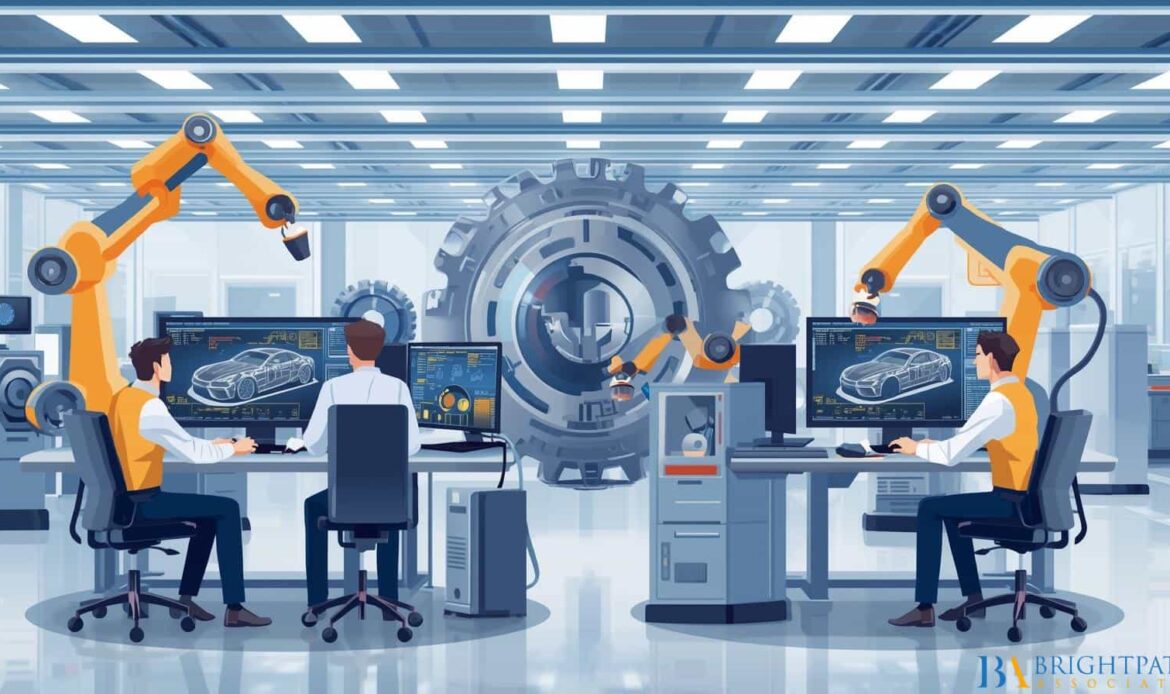The automotive industry is moving faster than ever before. With rapid technological progress, rising sustainability goals, and changing consumer preferences, manufacturers must constantly improve their efficiency. Streamlining manufacturing processes is not just about reducing costs; it’s about transforming how vehicles are designed, built, and delivered.
To stay competitive, companies need to adopt advanced tools, smarter systems, and efficient work methods. The focus today is on automation, data-driven decision-making, and attracting skilled professionals through effective automotive talent acquisition.
Role of Technology in Automotive Manufacturing
Technology is the main driver behind modern #automotivemanufacturing improvements. Tools like artificial intelligence (AI), robotics, and automotive manufacturing analytics help reduce human error, speed up production, and improve overall accuracy. AI systems can predict maintenance needs, analyze workflows, and optimize operations in real time.
Meanwhile, robotics ensures precise and repeatable processes on assembly lines. The integration of the Internet of Things (IoT) has also changed how manufacturers track production. Sensors and connected devices provide real-time data about machine performance, inventory, and supply chains. This allows quick decisions that prevent delays and improve product quality.
By combining these technologies, manufacturers achieve higher productivity, better safety standards, and lower costs—all essential in today’s fast-moving automotive market.
Rise and Impact of Electric Vehicles (EVs)
The shift toward electric vehicles (EVs) is one of the biggest automotive industry trends. Unlike traditional cars, EVs use complex components such as lithium-ion batteries, electric motors, and smart energy systems. This change has required major updates to manufacturing processes and factory setups.
Companies are investing heavily in training their workforce and retooling facilities to handle EV production. Automotive talent acquisition now focuses on engineers and technicians skilled in EV technologies, software systems, and sustainability practices. Supply chains are also evolving to source materials like lithium, nickel, and cobalt more efficiently.
Beyond production, the rise of EVs highlights the importance of sustainability. Manufacturers are using renewable energy, recyclable materials, and cleaner production methods to reduce environmental impact and meet global emission standards.
Importance of Automotive Industry Consulting
To navigate these changes, many companies rely on automotive industry consulting. Consultants help businesses identify weaknesses, adopt new technologies, and improve production efficiency. They guide manufacturers in areas like automotive supply chain consulting, logistics optimization, and lean manufacturing.
Consultants bring valuable experience and best practices from across the industry. They help manufacturers cut waste, improve quality, and lower production costs. In addition, consulting often includes ongoing support—ensuring that improvements remain effective in the long term.
By working with expert consultants, automotive businesses can become more flexible, productive, and ready for future market challenges.
Data-Driven Decisions in the Automotive Market
In today’s competitive environment, data is one of the most powerful tools for success. Using automotive manufacturing analytics, companies can track performance, predict equipment issues, and improve workflow efficiency. Data-driven decisions help manufacturers reduce downtime and maintain consistent product quality.
Automotive sales analytics also helps businesses understand customer preferences and market demand. By studying real-world data, companies can predict which models will sell best and plan their production schedules accordingly. This approach reduces waste, saves resources, and boosts profitability.
Beyond manufacturing, data is used to monitor how vehicles perform after they’re sold. This feedback loop allows automakers to refine designs, improve features, and enhance customer satisfaction.
The Future of Automotive Manufacturing
The future of automotive manufacturing lies in automation, digitalization, and sustainability. Smart factories—powered by AI, sensors, and IoT—are transforming how vehicles are produced. These facilities use data to self-monitor, predict problems, and optimize workflows automatically.
Predictive maintenance is another major advancement. Using analytics, machines can alert operators before failures occur, preventing costly downtime. This makes operations smoother and more cost-effective.
Sustainability will continue to guide the industry’s growth. From using recycled materials to generating power from renewable sources, car manufacturers are making production greener. Embracing these innovations will help companies meet environmental standards and build stronger brand reputations.
Challenges and Opportunities Ahead
The automotive industry faces both challenges and opportunities. Rising costs, global supply chain issues, and a shortage of skilled labor are major hurdles. Adapting to stricter emission regulations and digital transformation also adds pressure.
However, these challenges open doors for innovation. Companies that invest in automotive technology, analytics, and workforce development can turn obstacles into strengths. With expert consulting and smart planning, manufacturers can overcome disruptions and build more resilient operations.
The key to success lies in flexibility and forward-thinking. As the market continues to evolve, those who embrace change will lead the next wave of automotive excellence.
Conclusion
Streamlining manufacturing processes is the key to long-term success in the automotive industry. Embracing new automotive technology, leveraging automotive industry consulting, and using data-driven insights allow manufacturers to stay efficient and competitive.
The rise of #electricvehicles has transformed how cars are designed and built, while sustainability has become a central business priority. Meanwhile, addressing skill shortages through smart automotive talent acquisition ensures companies are ready for the future.
As innovation and sustainability shape the road ahead, businesses that act early will gain a clear advantage. To explore expert consulting and recruitment support for your automotive operations, visit Automotive Industry.
Find your next leadership role in Automotive Industry today!
Stay informed with the latest insights on Automotive Industry!

